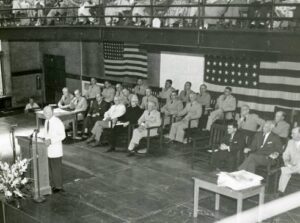This post was originally published on June 19, 2015.
![51.06.01 USNA speech [948]](https://www.marshallfoundation.org/wp-content/uploads/2015/06/51.06.01-USNA-speech-948-249x300.jpg) June graduations and commencement addresses are great collegiate traditions and the last opportunity to influence students. General Marshall said he tried his “best to influence young people whenever I came in contact with them in public talks.” In this digital era, when there is so much information available, General Marshall’s reply to Edward R. Morrow’s question, “I was wondering whether you would have any words of counsel to give to the youngers of this country?” is exceptionally relevant. General Marshall urged young people to “make a practice of searching for the facts and not being overwhelmed with the torrent of statements [which] are very confusing [and] very difficult to understand. So the best that I could think of was our young people should grow up in the habit of trying to get at the facts, instead of merely traveling on emotions.”
June graduations and commencement addresses are great collegiate traditions and the last opportunity to influence students. General Marshall said he tried his “best to influence young people whenever I came in contact with them in public talks.” In this digital era, when there is so much information available, General Marshall’s reply to Edward R. Morrow’s question, “I was wondering whether you would have any words of counsel to give to the youngers of this country?” is exceptionally relevant. General Marshall urged young people to “make a practice of searching for the facts and not being overwhelmed with the torrent of statements [which] are very confusing [and] very difficult to understand. So the best that I could think of was our young people should grow up in the habit of trying to get at the facts, instead of merely traveling on emotions.”
 General Marshall was renowned for drilling himself to keep pertinent facts in his mind. This insistence on knowing the relevant facts before expressing an opinion was restated again in his address to the 1956 graduates of the Virginia Military Institute when he cautioned the cadets to “go very carefully in making up your mind about various things…try to search out for what seems to be the facts. The effort to get at the facts is the important thing. And if you will permit me I will counsel you to try to do that. It’s not so difficult as it seems. If you take a careful resume of the whole thing and don’t’ be devoted to one voice you begin to get something which approaches the facts. Then you are in a position to express and opinion. And if you will permit the suggestion from me my best advice that I could give you in the present day is: Don’t be a deep feeler and a poor thinker. I’ll repeat that again. Don’t be a deep feeler and a poor thinker.”
General Marshall was renowned for drilling himself to keep pertinent facts in his mind. This insistence on knowing the relevant facts before expressing an opinion was restated again in his address to the 1956 graduates of the Virginia Military Institute when he cautioned the cadets to “go very carefully in making up your mind about various things…try to search out for what seems to be the facts. The effort to get at the facts is the important thing. And if you will permit me I will counsel you to try to do that. It’s not so difficult as it seems. If you take a careful resume of the whole thing and don’t’ be devoted to one voice you begin to get something which approaches the facts. Then you are in a position to express and opinion. And if you will permit the suggestion from me my best advice that I could give you in the present day is: Don’t be a deep feeler and a poor thinker. I’ll repeat that again. Don’t be a deep feeler and a poor thinker.”
In this day of information overload he might add the only bit of advice that he gave to George F. Kennan when he came to the State Department to set up the Policy Planning Staff that would develop a plan for the rebuilding of post-war Western Europe. That advice was “Avoid trivia.”
